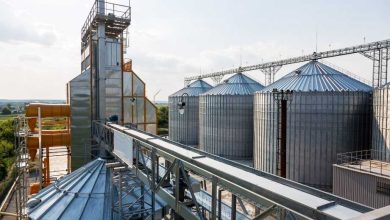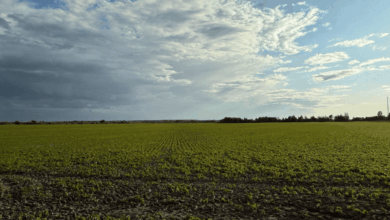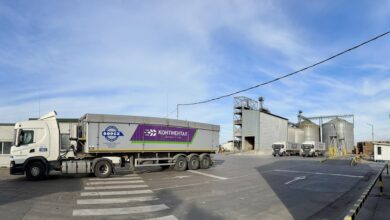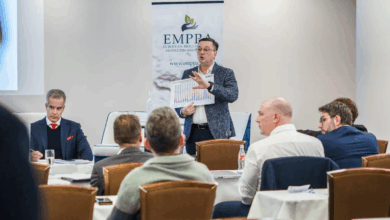Betting on the Niche
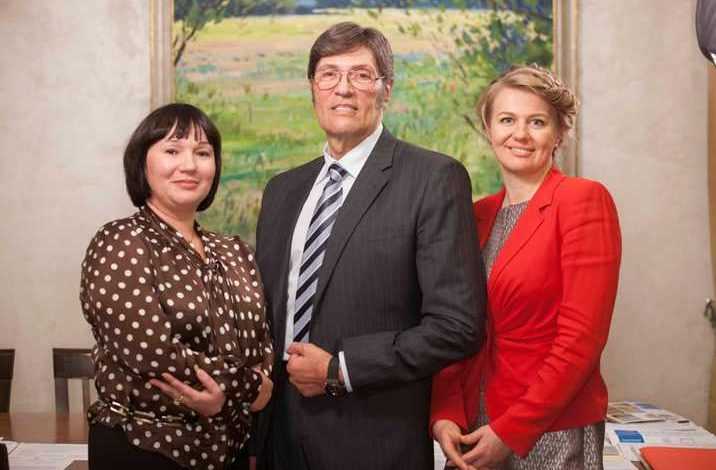
Rutitskaya organizes summits, forums and exhibitions, as well as helps the Ukrainian agrarians find new markets. You can hardly find a fund, European official or a business representative who had no contacts with Rutitskaya at least once. Such devotion requires a lot of time. Not less busy is our second participant, a representative of large business Alex Oronov. An American with Ukrainian roots, he has been investing in the Ukrainian agribusiness since 1994. Founded by Oronov, “Baryshevskaya Zernovaya Kompaniya” (Grain Alliance) has 50,000 hectares of land in leasing and grows grain and oil plants there. It is one of the most efficient crop-growing holdings in Ukraine — its EBITDA index per hectare is $560. The growth of the company’s business and the introduction of new technologies at its fields are kept under Oronov’s personal control. The third discussant is Larisa Bondareva, a board member of the Credit Agricole Bank.
A lion’s share of the loans provided by this bank accrues to the agricultural business. Bondareva, as a person responsible for corporate business in the Credit Agricole, is always up to the minute with the current affairs of farming companies and knows the ropes in the niceties of their structure and activity. After a long coordination, our main characters finally made time to meet the LL editor and discuss a string of topical questions: new financing mechanisms, rights and duties of large businesses, methods of “seducing” foreign investors and agricultural products importers. We and our guests discussed all these and other topics for over two hours. Please visit landlord.org.ua for a full version of the conversation.
LL: Alex, you have built a large holding, and you work with foreign partners. Are ways of doing business still strikingly different when you compare same-size companies in Ukraine and other countries, or the boundaries become blurred gradually?
Alex Oronov: It is too early to speak about the land market, as there is no legislative framework, no land cadastre. If holdings work transparently, i.e. pay all taxes, the state will fully see the financial results of their operations. Flat land tax is constantly increasing; it will grow by another 50 % next year. Many holdings do not even sign legal documents with people from whom they lease land plots, they conceal taxes; a lot of them still pay envelope wages. Foreign companies work in other reality that is why, yes, there are a lot of differences. In my conversations with foreign investors I have to tell once and again what is our company’s position in the market, what interrelations we have with the state officials and the bankers. This is what they are interested in. They do not ask me about the operations of “Fond Vozrozhdeniya Sela” (“Rural Revival Fund”) founded by our company three years ago, with the help of which we cover topical social questions. Such problems are new for them, because everything is much more clear and transparent in their countries: you work, earn, then pay taxes, pay wages to the people and cover medical insurance for your employees. They do not understand the logics of Ukrainian agricultural holdings’ owners: you earn money, and then help the village, the residents of which let out their land on lease. If you do not pay, you can lose a part of your business basis tomorrow. The land belongs to the people, not to companies. If the lessors are satisfied with the conditions and attitudes on the part of the lessee, the cooperation will be long-term and fruitful for all the parties.
LL: Will lifting the moratorium on the sale of land in Ukraine help the business?
A.O. I am not sure. What was the result of land privatization in Czech Republic, Slovakia, Bulgaria etc.? Large pieces of land turned into private vegetable gardens causing a chessboard effect. There are no large agricultural companies in these countries today. Leasing is an effective mechanism. That is why the Ukrainian holdings should not wait for the land market as a panacea; they should simply build up relationships with land plot owners wisely, find a common language and behave handsomely. There is no need to wait until the countrymen come one after another and beg: “Give me some money, my roof is leaking”, but provide an annual budget for covering social issues and timely lease payments. For instance, we allocate money for social needs on the annual basis and, thankfully, we are in the position to increase this amount from year to year. My holding includes about 35 units. I allocate 200,000 to 300,000 hryvnias for each of them. A year ago yet another idea struck me on how to improve our social policy. Gas prices are increasing, so our lessors will encounter new problems. We arrived at an idea that, on the one hand, it makes sense to offer boilers to the people. On the other hand, it wouldn’t be bad to utilize organic wastes, for instance, corn leaves which remain on the field after harvesting. Now we make pellets out of them at the plant which has been recently launched in the village of Kulikovka near Chernigov. Today, we furnish our lessors with pellets. We will bring the pellets to an elderly woman’s or man’s house, and they will not have to think of where, in what areas to look for the firewood for winter. We have not given up the idea of boilers and ordered them at a lowest price. Not for the reason that we begrudge money but because we need at least 10,000 such boilers.
Putting it another way, if every fulfills its obligations before the people, there will be no need to bring up the question of land market for many years to come.
Vladislava Rutitskaya: Be that as it may, this question is brought up anyway. For example, we discuss it within the framework of common project with the World Bank; this is the work on the land legislation which is to facilitate the improvement of the investment climate. The second question is a transparent land cadastre. We study the practice of other countries in every detail. In particular, we are guided by some norms of land legislation of the Netherlands.
LL: Issues around the land have been under discussion for many years. No doubts, sooner or later this work will bring some results. But there are things which cannot wait, like new financing mechanisms.
V.R.: Everyone has heard about the introduction of a new mechanism, agrarian receipts, lately. It is meant primarily for medium-sized and small companies, but large-scale holdings will be able to make use of it as well. For instance, “Baryshevskaya Zernovaya Kompaniya” will have no problems with receiving an agrarian receipt or, vice versa, issuing it. That is, large-scale companies may be both recipients and investors, supporting the medium-sized and small producer in the region where it runs its business.
To draw up an agrarian receipt one should provide a package of documents, including a document which specifies where precisely the field is situated and what exactly will be grown on it. We come back again to the questions of land and the electronic land cadastre. An agrarian receipt is actually an instrument of providing a working capital for operations against future yield. We cannot run away from the land problem, as everything is interrelated: investments, financing, planning and development. In early 2015 we increased a minimum term of farming land leasing from five to seven years. It is necessary for the investors to feel more secure, to understand that the money invested by them is protected at least this way, and they can count on the return of investment. We have received a great number of requests to increase the minimum lease term up to 15 years. For the time being we are discussing if it is feasible.
Larisa Bondareva: For us, the bankers, it is very important to know how the entire large-scale project will be financed in case if the decision about sale of agricultural lands is adopted. Today, if we are speaking about agricultural sector financing, neither working capital nor investment requirements set by agricultural producers of a different scale have been sufficiently financed. About 70% of equipment park needs to be modernized. We have already witnessed a substantial deficit of funds to finance this year’s sowing season. And despite the fact that many banks declare their interest in cooperation with the agrarian business, only few of them support the agribusiness. If we talk about the land market, about purchasing all these land lots which are on lease now, it is hard to imagine how, considering current situation in the banking system, the banks will be able to provide such huge loans. Similarly, perhaps, few foreign investors are willing to invest money in Ukraine for the purchase big land allotments in the present-day situation. We univocally endorse the initiatives aimed at the increase of the land lease term. We hear such wishes both from large and medium businesses.
LL: Another topical issue which is being decided now jointly by the Ministry for Agrarian Policy, producers and financial institutions, it is gaining of a foothold on new markets for the Ukrainian agricultural products and the search of a worthy alternative to the Russian market.
V.R.: The European market is very complicated. In Europe, there are quite strong producers — companies which work not only in their own interests but also in the interests of the European farmers by constantly improving the logistics and distribution system. Finding our place among their ranks is not an easy task for us. At the same time, about 200 Ukrainian companies are working with the European market today. Another specific feature of the European market is that securing a foothold in it is a more likely task for companies exporting the value-added products. But why are we talking only about Europe? There is also an enormous Asian market which accounts for about 46 % of the Ukrainian exports in 2015. About 14 % is our exports to Africa.
LL: For all that, how should Ukrainian companies change in order to worthily compete at the European market?
A.O.: Find unique niches for themselves and grow there. Grain has always been a comprehendible story – as it is in demand. I have been selling grain since 1997, and over the whole period selling it has never been a question. But there are a lot of companies dealing with grain. We still need certain time to produce and export value-added products. But dealing with niche products is a business that can be started right tomorrow, given the will and understanding in what direction to move. Among the niche products we may consider, for example, soya beans without genetic modifications. World’s biggest soya producers, i.e., USA, Canada and Brazil, have moved to GMO. Pure soya can easily and very effectively compete with this product on the global market. This year, despite poor weather conditions, we have gathered an excellent harvest of soya beans, about 3 tons per hectare. This is the third year in a row that we are selling soya to Japan. We also plan to organize deliveries to France and Austria — we are already negotiating with companies from these countries. A Japanese company sold us equipment for soya cleaning and sizing. It was a $1 million purchase. My managers went to Japan and stayed there for a fortnight, while the plant was being dismantled. We put the equipment in 27 containers and brought to Ukraine. And we assembled it in Ukraine (on a hunch, as for the Japanese had given to us not a single instruction manual which would say how to do it correctly). Now this plant enables us to prepare top quality soya beans for export. We supply them to Japanese supermarket stores. I buy soya seeds from several Canadian companies. They are constantly experimenting and testing new developments at their fields. Their field area averages 50 hectares. This is obviously insufficient. I have offered them to extend our cooperation and work in Ukraine. Next year, two Canadian companies (one of them is Sevita) will grow soya for seeds on a part of our fields, and sell these seeds to Ukrainian crop-growing enterprises. Such ongoing communications and cooperation expand our horizons and offer new opportunities. For instance, a representative of one of these companies once told me about a Scandinavian fish producer who needed soya bean meal and was ready to purchase it at a good price. He also told me about companies interested in soya bean oil. “Would it be interesting for you to make business on soya bean meal, too?” he asked me. “If I have a regular buyer on contractual basis, sure enough, I will do it with pleasure,” I answered.
LL: Larisa, are the banks ready to finance such projects?
L.B.: In reality, it was our bank that backed Alex’s company in purchasing the Japanese equipment. It is absolutely properly noted: if a company has a clear business model, a business plan, and an understanding where and to whom the commodity is to be sold, the banks are willing to support such a company. Everybody understands that accessing a foreign market with a new product is a great piece of work. I remember this project on the purchase of the Japanese equipment at the stage of discussion. An important indicator — in order to enter the Japanese market soya must comply with over 100 quality parameters!
LL: If it is so hard for large holdings to conclude contracts, then medium and small companies are out of question… Is it not worth even trying it for them?
V.R.: Today we sign memorandums on cooperation or cooperation programs with many countries. There is always a clause concerning trade promotion or trade support in all such documents. It is of great importance for us to inform small and medium-sized producers on the opportunities and requirements. I remember that a year ago Larisa and I were discussing the standards and available mechanisms to familiarize our producers with these standards. We were talking that small producers could and should be combined into cooperative societies, because this offers greater opportunities. A cooperative society can independently enter a foreign market and conclude profitable contracts with traders. There are more small businesses among producers of niche products Alex was talking about: flax, honey, mustard, pumpkin seeds.
LL: Alex, do you share the opinion that a medium business can be involved in international trade on equal grounds with large companies?
A.O.: I am positive that all this is interrelated. Large, medium and small companies are not competitors, they are partners. This is not a competition for a market share but cooperation. It is much simpler for small enterprises to bring their grain to a cereal-handling elevator belonging to a large company than to keep it at theirs and try to find any other routes to enter the market. Holdings are by no means always able to grow a sufficient amount of grain crops to fill their storage capacities, or provide volumes laid down in export contracts. In the future I plan to deal in one more niche product — beans. I brought 16 bean cultivars from the USA, but unfortunately, only two of them have naturalized. We do not grow beans at our fields but give them to people for growing on their home plots.
LL: And what are you going to do with the beans: sell them in Ukraine or export them as well?
A.O.: The Japanese with whom I cooperate on soya will gladly purchase beans from me. Similar situation is with the pumpkins.
LL: Does the Ministry help the farmers who have ambitions to try hand in the international trade?
V.R.: We certainly provide support to the representatives of small and medium agrarian business. We work with the embassies, the American Chamber of Commerce. I am motivated by this kind of logics: the bigger is the number of sellers and the greater representation of Ukraine at international markets the greater are budget revenues. I am very actively working both with business and business associations.
A.O.: I would like to add a couple of words. The main thing for the farmer, no matter how big the company is, is patience and hard work. Not everything is done overnight. One should be able to wait. It concerns even the harvest, as a surprise is waiting for you each year. No matter how much you experiment and invest during the year, you will gather crops only once a year and you will never know for sure what you are to expect. I would gladly bring the Brazilian climate to Ukraine in which one can gather crops at least twice a year. But it is impossible. That is why I have started agribusiness here, in Ukraine, for people who live here are very patient, talented and purposeful. 90 % of employees in my company are country people. I am very satisfied. And they are not only employees of the agrarian department. My IT specialists and PC specialists are youngsters from rural communities. There is one very talented guy who can out of four computers make the fifth one.
LL: Larisa, will the banks endorse the initiative of such companies as the Alex’s? Perhaps, there exist some special programs for such enthusiasts?
L.B.: Of course, we will. And I would like to get back to the conversation about the bridge connecting large Ukrainian holdings and foreign companies with medium and small agricultural producers. The role of major players is crucial, in my opinion. I often meet with representatives of holdings, foreign suppliers of seeds and crop protection agents, or corn traders. During these meetings we are talking not only as to the loans and other services provided to these companies. As a rule, I am asked the question, “What you, as a large bank, can offer to our partners – small producers with whom we cooperate?” I am referring to the enterprises which sell agricultural products to the holdings, buy seeds from foreign producers, etc. What are the points of concern? Small companies experience problems with access to financing, cost of financing, and frequently, non-compliance with requirements of the bank. And we, together with large companies, develop and introduce partner programs which help the small business develop, as well. I will not bring up such an issue as financial culture. I regret to say that, as for now, such culture leaves much to be desired in many small and medium companies. For this reason the banks perform an educational function now, too. We consult companies which are the prospective consumers of the banking product. We tell what services exist, what exactly is more advantageous for them to use, based on the specific nature and size of their business, what risks exist and how to mitigate these risks. We are interested in cooperation with companies that think not just one sowing season, but on a much larger scale — about the development of their business for many years to come.



